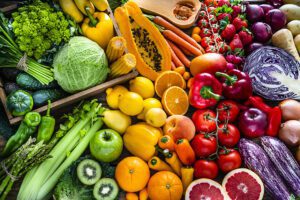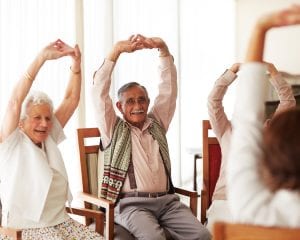Hello and welcome to my October blog.
This month I am delighted to welcome dietitians Vittoria Romano and Alison Smith who have written an excellent and informative guest blog for the Charity about nutrition and hydration for older people.
Introductions:
Vittoria Romano is a community dietitian who specialises in care of older adults, supporting care homes and appropriate prescribing of nutritional products. Vittoria is chair of the British Dietetic Association (BDA) Older People Specialist Group (OPSG).
Alison Smith is a prescribing support consultant dietitian who also specialises in care of older adults, supporting care homes and appropriate prescribing of nutritional products. Alison is the chair of the Department of Health and Social Care Advisory Committee on Borderline Substances (ACBS). Alison is also a committee member of the BDA OPSG.

A healthy diet means different things for different people as we all need different things at different life stages. Nutrition needs for older adults (65 years and over) are slightly different from the needs of the rest of the adult population.
As we age our risk of developing illness and frailty can increase. Eating and drinking well can help us to age well and to reduce risk of becoming ill and/or frail.
What do we mean by eating and drinking well?
We all tend to be familiar with the EatWell Guide and its recommendations for healthy eating for the population. Older adults are likely to benefit from:
- eating a diet slightly higher in protein (among other things, protein gives us the building blocks to help keep our muscles strong)
- having a wide range of vitamins and minerals including a slightly higher intake of vitamin B12 (found mainly in animal products); calcium (found abundantly in dairy products); folate (found mainly in green leafy vegetables)
- taking a purchased vitamin D supplement each day (we can create vitamin D from action of sunlight on skin but many people are likely to benefit from taking a supplement)
- drinking enough fluid (older women need to aim for about 1,600ml fluid a day and older men need to aim for about 2,000ml per day)
- enjoying food and mealtimes is also a key part of eating and drinking well
What else can help?
Keeping physically active as we age is also really important to help us stay well, strong and independent.
It can feel that there is a lot of pressure on all of us to diet and lose weight, including as we get older. It may therefore come as a surprise to learn that in older age being a little heavier and maintaining your weight is likely to be better for us than being thin or losing weight.

What could help me if I’m not eating well and am losing weight without trying to?
People who have a small appetite tend not to eat as much as they need. They may benefit from eating smaller meals more often, and choosing foods and drinks that contain the nutrition we all need but in a smaller volume. There are a lot of foods which fit this bill perfectly and these are known as “nutrient dense” foods for example skimmed milk powder added to ordinary milk can increase your energy, protein, vitamin and mineral intake in the same amount of milk.
Where can I find more information?
There is new information for older adults about how to eat more healthily coming soon to both Friends of the Elderly and the British Dietitian Association so keep checking the websites for the launch!
—————————
Thank you to Vittoria and Alison for this really helpful information. Kindest regards to you all and I will be back in November with my next blog.
Steve
Steve Allen, Chief Executive of Friends of the Elderly, writes a regular blog which gives insight into his role at the Charity.
He offers information and advice about important areas affecting older people and their families. Steve can be reached at chiefexecutive@fote.org.uk.
Watch this space for more of Steve’s posts.
